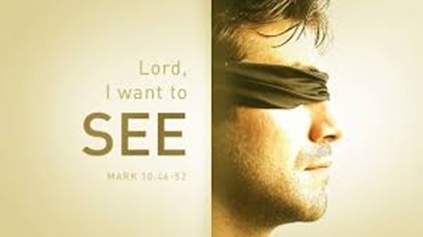In the musical: ‘My fair lady’, Freddie and Eliza have a conversation of profound insight. Freddie is wooing Eliza, trying to describe to her, his feelings towards her. He is using examples of this physical world, to try to get his message of passion across. Example after example, word after word. And Eliza responds, “I’m so sick of words…For heaven’s sake: just show me…show me; don’t explin’, show me!”.
A bit like James’ writing, “Show me your faith without deeds, and I will show you my faith by my deeds.”
In our Gospel reading today, we read of Jesus showing by deeds his: faith in God, by curing the blind man, Bar-Timaeus.
NOW: Several things we must always keep in mind when reading scripture: there are always several levels in the meaning, of understanding, why the particular story was recorded, and what it means.
We must look at the physical story, of course; look at the physical level; but also, we must look through the physical, and into the spiritual meaning, and God truths of the message, lying within the story.
When looking at a picture we can say, “what does that picture say to us, what response does it make”, yet more importantly, we ought to ask: “what did the painter want to say, by painting the scene that way?”
So, today in our reading, what does Mark want to say to us, about what Jesus says and does, with the son of Timaeus, and hence about what Jesus is wanting to say to us, about the love of God in our lives!
SO: back to that question from last week: where did you see the God of love, this last week?? Don’t talk of love: show me!! Where did God show you love?
But that’s about ‘me’. God showing ME love. And that’s fine, we need that. But there’s more to the story.
Today we think of – where do we see the God of love, in the life of someone else.
As Freddie found, is very hard to describe love in physical terms. So here in our Gospel reading today we see something of the God of love working.
It needs the community.
Jesus himself does not call the man but does it through the mediation of the community. And, since the death of Jesus, it’s through our community of faith that he calls us.
I’ve often wondered why some people come to Church, like’ old Marmaduke’. A tough man, a tradie, who allowed no messing about. I wondered then, as I did when I took his funeral: what did Jesus mean to that man? …
As I have wondered about so many people: “why do they come to Church?”. And even, ‘why do I go to church?’!! I think the answer lies in ‘community’… worshipping God, in the community of other God loving people, life living people, with an infusion of God in their lives.
Then we read: ‘the man threw off his cloak’, for he was willing to let go the protection that he wore before the world and entrust himself to Jesus. Perhaps we can reflect on what we hold dear around us, that needs to be got rid of, so that God’s love can enter more fully into our lives.
Jesus, with typical respect, does not presume to know what it is that the man wants, so he asks him: ‘What do you want me to do for you?”. And for us: the question: What do you want Jesus to do for you? As my Aunt Maude used to say, “I don’t know what I mean till I see what I say”. As for us, “I don’t know what I want Jesus to do for me, until I put it into words. Specifically. Exactly.
The man, though now blind, had seen in the past. It was the same with the disciples. They saw when Jesus called them; they saw when they watched him heal; they saw when he fed the crowds and when he walked on the sea; and when on numerous occasions, he took them aside and healed their ‘sight’, their understanding of what had happened… But they kept forgetting; they kept being distracted; they kept losing the clarity of their sight.
Now, in this blind beggar, they acknowledge Jesus as their ‘Teacher’, and themselves, therefore, as his disciples.
And for us: If we are ever going to understand Jesus and his teaching, it will have to be Jesus: who gives us sight.
Just as Jesus assures the blind beggar that it is ‘faith ‘ that makes it possible for him to be healed, and so to see, so with us: the only sight we (Jesus’ disciple) can have is the seeing of faith: the seeing of a mind and heart that knows its own powerlessness, and that cries out for grace, trusting in the mercy of God, the God of love (as revealed in Jesus).
It is this faith, and nothing else, that makes it possible for us, (the disciple), to ‘follow him on the way’ —
To follow Jesus on the way.
And Jesus’ way is always to relate with us with grace: disturbing, encouraging, welcoming, threatening, warning, grace…
…never content to see us where he first found the blind beggar, and to leave us there, but always loving, forgiving, encouraging; and, healing us: so that we can see him more clearly, see him ever closer to us, and to be reassured (again and again!), that he wants us, all of us, and every bit of us, to follow him on the way, because his way is the only way to life.
AMEN

